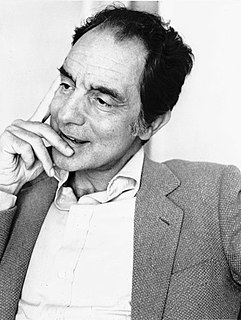
Italo Calvino was an Italian writer and journalist. His best known works include the Our Ancestors trilogy (1952–1959), the Cosmicomics collection of short stories (1965), and the novels Invisible Cities (1972) and If on a winter's night a traveler (1979).

Saul Bellow was a Canadian-born American writer. For his literary work, Bellow was awarded the Pulitzer Prize, the Nobel Prize for Literature, and the National Medal of Arts. He is the only writer to win the National Book Award for Fiction three times and he received the National Book Foundation's lifetime Medal for Distinguished Contribution to American Letters in 1990.
Allan David Bloom was an American philosopher, classicist, and academician. He studied under David Grene, Leo Strauss, Richard McKeon, and Alexandre Kojève. He subsequently taught at Cornell University, the University of Toronto, Tel Aviv University, Yale University, École normale supérieure of Paris, and the University of Chicago. Bloom championed the idea of Great Books education and became famous for his criticism of contemporary American higher education, with his views being expressed in his bestselling 1987 book, The Closing of the American Mind. Characterized as a conservative in the popular media, Bloom denied that he was a conservative, and asserted that what he sought to defend was the "theoretical life". Saul Bellow wrote Ravelstein, a roman à clef based on Bloom, his friend and colleague at the University of Chicago.
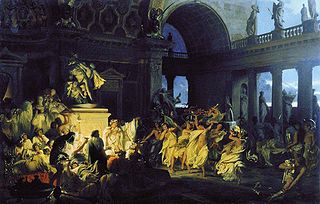
The word decadence, which at first meant simply "decline" in an abstract sense, is now most often used to refer to a perceived decay in standards, morals, dignity, religious faith, honor, discipline, or skill at governing among the members of the elite of a very large social structure, such as an empire or nation state. By extension, it may refer to a decline in art, literature, science, technology, and work ethics, or to self-indulgent behavior.
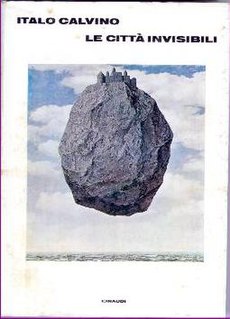
Invisible Cities is a novel by Italian writer Italo Calvino. It was published in Italy in 1972 by Giulio Einaudi Editore.

Nathalie Sarraute was a French writer and lawyer.

Alain Robbe-Grillet was a French writer and filmmaker. He was one of the figures most associated with the Nouveau Roman trend of the 1960s, along with Nathalie Sarraute, Michel Butor and Claude Simon. Alain Robbe-Grillet was elected a member of the Académie française on 25 March 2004, succeeding Maurice Rheims at seat No. 32. He was married to Catherine Robbe-Grillet.
Postmodern literature is a form of literature that is characterized by the use of metafiction, unreliable narration, self-reflexivity, intertextuality, and which often thematizes both historical and political issues. This style of experimental literature emerged strongly in the United States in the 1960s through the writings of authors such as Kurt Vonnegut, Thomas Pynchon, William Gaddis, Philip K. Dick, Kathy Acker, and John Barth. Postmodernists often challenge authorities, which has been seen as a symptom of the fact that this style of literature first emerged in the context of political tendencies in the 1960s. This inspiration is, among other things, seen through how postmodern literature is highly self-reflexive about the political issues it speaks to.

The Nouveau Roman is a type of 1950s French novel that diverged from classical literary genres. Émile Henriot coined the term in an article in the popular French newspaper Le Monde on May 22, 1957 to describe certain writers who experimented with style in each novel, creating an essentially new style each time. Most of the founding authors were published by Les Éditions de Minuit with the strong support of Jérôme Lindon.

Timothy Harold Parks is a British novelist, translator, author and professor of literature.

Experimental literature is a genre that is, according to Warren Motte in his essay "Experimental Writing, Experimental Reading", "difficult to define with any sort of precision." He says the "writing is often invoked in an "offhand manner" and the focus is on "form rather than content." It can be in written form of prose narrative or poetry, but the text may be set on the page in differing configurations than that of normal prose paragraphs or in the classical stanza form of verse. It may also be entwined with images of a real or abstract nature, with the use of art or photography. Furthermore, while experimental literature was traditionally handwritten on paper or vellum, the digital age has seen an exponential leaning to the use of digital computer technologies.
François Weyergans was a Belgian writer and director. His father, Franz Weyergans, was a Belgian and also a writer, while his mother was from Avignon in France. François Weyergans was elected to the Académie française on 26 March 2009, taking the 32nd seat which became vacant with the death of Alain Robbe-Grillet in 2008.
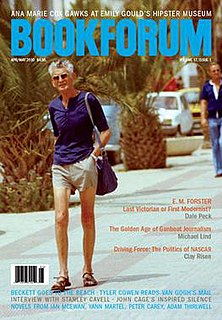
Bookforum is an American book review magazine devoted to books and the discussion of literature. Based in New York City, New York, it comes out in February, April, June, September, and December.
Literature of the 20th century refers to world literature produced during the 20th century.

A classic is a book accepted as being exemplary or noteworthy. What makes a book "classic" is a concern that has occurred to various authors ranging from Italo Calvino to Mark Twain and the related questions of "Why Read the Classics?" and "What Is a Classic?" have been essayed by authors from different genres and eras. The ability of a classic book to be reinterpreted, to seemingly be renewed in the interests of generations of readers succeeding its creation, is a theme that is seen in the writings of literary critics including Michael Dirda, Ezra Pound, and Sainte-Beuve. These books can be published as a collection, or presented as a list, such as Harold Bloom's list of books that constitute the Western canon. Although the term is often associated with the Western canon, it can be applied to works of literature from all traditions, such as the Chinese classics or the Indian Vedas.
The Literature of Exhaustion is a 1967 essay by the American novelist John Barth sometimes considered to be the manifesto of postmodernism.
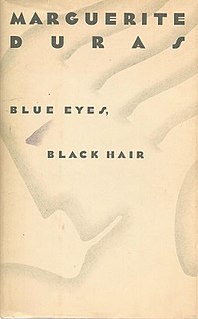
Blue Eyes, Black Hair is a 1986 novel by the French writer Marguerite Duras. It tells the story of a couple who meet by chance in a small vacation town. The man is homosexual and has recently fallen in love with a man with blue eyes and black hair. After meeting the woman at a cafe, he pays the woman to come to his room so that he can look at her, presumably in order to learn something about women or love.
Eva Ingrid Elisabet Alexanderson was a Swedish writer, translator and publisher. Her best known works are her 1969 lesbian novel Kontradans and her 1983 translation of Umberto Eco's The Name of the Rose.
Jean Thibaudeau was a French writer and translator.
René Marill Albérès, or R. M. Albérès, was the pseudonym of René Marill, a French writer and literary critic. He published book-length studies of Antoine de Saint-Exupéry, André Gide, Gérard de Nerval, Jean Giraudoux, Jean-Paul Sartre, Michel Butor, Franz Kafka, as well as surveys of the novel in twentieth-century European literature.












